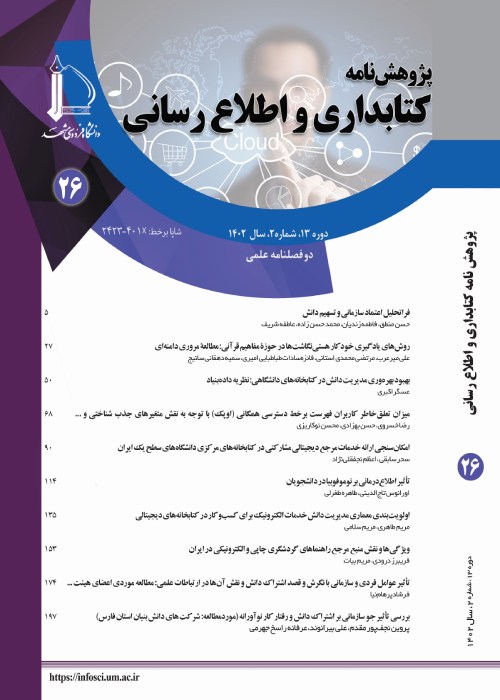Using the Information Literacy Framework (2016) for Evaluating Information Literacy of Higher Education Students (Case Study: Shahid Chamran University of Ahvaz)
With the advent of the twenty-first century, the educational centers are in transition from the educational process to the teaching-learning process. In this process change, every citizen must be freely exposed to learning, education and research under any circumstances. Therefore, attention to training information literacy skills is one of the key elements in the advancement of lifelong learning and modern education system. The main purpose of this study is to investigate the viewpoint of graduate students about the factors affecting the status of information literacy in Shahid Chamran University of Ahvaz.
This study is an applied research carried out through a survey method. The study population consisted of all postgraduate students of Shahid Chamran University of Ahvaz who have completed at least two semesters of academic study before the second semester of 2019-2020. Because of the large size of the research population, sampling was done. The sample size has been determined as 380 subjects through Krejcie-Morgan formula. The data collection tool was a researcher-made information literacy questionnaire that its validity was confirmed by the faculty members of the Knowledge and Information Department of Shahid Chamran University of Ahvaz and its reliability amounted to.82.
The features of the context and previous learning affected the information literacy status of respondents at high and medium levels, the faculty members at the moderate level and IT facilities and libraries at the moderate and low levels. Based on the mean score rate, these four factors are contextual features, faculty members, the facilities of the university's information and communication technology and, finally, academic libraries, respectively.
As far as teaching information literacy skills and attention to technological methods are the first priorities of academic libraries as determined by Association of College and Research Libraries (ACRL) in 2018 and concerning information literacy framework (2016), regarding the role of students as learners and librarians as intermediates in learning the required skills, academic libraries should provide their services so that students independently improve their literacy skills and meet their information needs. Based on the instructions of 2016 framework, it is suggested that universities and higher education institutions move towards greater use of cyberspace, such as Web 2 and use facilities such as library websites and a virtual reference desk and an ongoing dialogue.
- حق عضویت دریافتی صرف حمایت از نشریات عضو و نگهداری، تکمیل و توسعه مگیران میشود.
- پرداخت حق اشتراک و دانلود مقالات اجازه بازنشر آن در سایر رسانههای چاپی و دیجیتال را به کاربر نمیدهد.


